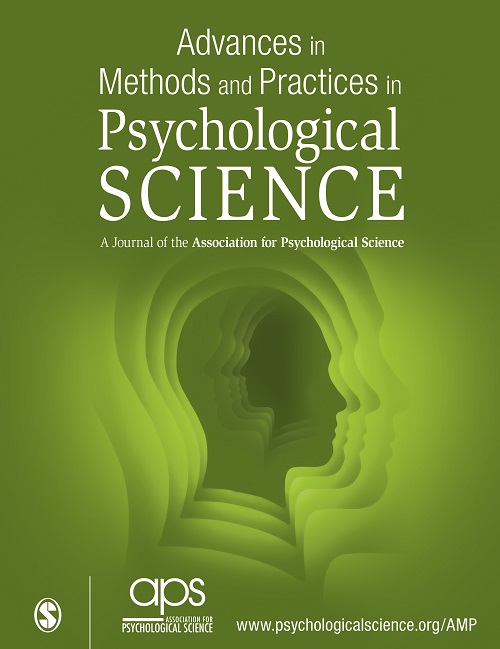A Traveler’s Guide to the Multiverse: Promises, Pitfalls, and a Framework for the Evaluation of Analytic Decisions
IF 15.6
1区 心理学
Q1 PSYCHOLOGY
Advances in Methods and Practices in Psychological Science
Pub Date : 2021-01-01
DOI:10.1177/2515245920954925
引用次数: 55
Abstract
Decisions made by researchers while analyzing data (e.g., how to measure variables, how to handle outliers) are sometimes arbitrary, without an objective justification for choosing one alternative over another. Multiverse-style methods (e.g., specification curve, vibration of effects) estimate an effect across an entire set of possible specifications to expose the impact of hidden degrees of freedom and/or obtain robust, less biased estimates of the effect of interest. However, if specifications are not truly arbitrary, multiverse-style analyses can produce misleading results, potentially hiding meaningful effects within a mass of poorly justified alternatives. So far, a key question has received scant attention: How does one decide whether alternatives are arbitrary? We offer a framework and conceptual tools for doing so. We discuss three kinds of a priori nonequivalence among alternatives—measurement nonequivalence, effect nonequivalence, and power/precision nonequivalence. The criteria we review lead to three decision scenarios: Type E decisions (principled equivalence), Type N decisions (principled nonequivalence), and Type U decisions (uncertainty). In uncertain scenarios, multiverse-style analysis should be conducted in a deliberately exploratory fashion. The framework is discussed with reference to published examples and illustrated with the help of a simulated data set. Our framework will help researchers reap the benefits of multiverse-style methods while avoiding their pitfalls.多元宇宙旅行者指南:承诺、陷阱和分析决策评估框架
研究人员在分析数据时做出的决定(例如,如何测量变量,如何处理异常值)有时是武断的,没有客观的理由选择一种替代方案。多宇宙风格的方法(例如,规格曲线、效果振动)估计整个可能规格集的效果,以暴露隐藏自由度的影响和/或获得对感兴趣效果的稳健、偏差较小的估计。然而,如果规范不是真正武断的,多元宇宙风格的分析可能会产生误导性的结果,可能会在大量理由不足的替代方案中隐藏有意义的效果。到目前为止,一个关键问题很少受到关注:如何决定替代方案是否武断?我们提供了这样做的框架和概念工具。我们讨论了替代方案中的三种先验非等价性——测量非等价性、效应非等价性和功率/精度非等价性。我们审查的标准导致了三种决策场景:E型决策(原则等价)、N型决策(原理非等价)和U型决策(不确定性)。在不确定的情况下,多元宇宙风格的分析应该以一种有意探索的方式进行。该框架参考已发表的实例进行了讨论,并借助模拟数据集进行了说明。我们的框架将帮助研究人员获得多元宇宙风格方法的好处,同时避免它们的陷阱。
本文章由计算机程序翻译,如有差异,请以英文原文为准。
求助全文
约1分钟内获得全文
求助全文
来源期刊
CiteScore
21.20
自引率
0.70%
发文量
16
期刊介绍:
In 2021, Advances in Methods and Practices in Psychological Science will undergo a transition to become an open access journal. This journal focuses on publishing innovative developments in research methods, practices, and conduct within the field of psychological science. It embraces a wide range of areas and topics and encourages the integration of methodological and analytical questions.
The aim of AMPPS is to bring the latest methodological advances to researchers from various disciplines, even those who are not methodological experts. Therefore, the journal seeks submissions that are accessible to readers with different research interests and that represent the diverse research trends within the field of psychological science.
The types of content that AMPPS welcomes include articles that communicate advancements in methods, practices, and metascience, as well as empirical scientific best practices. Additionally, tutorials, commentaries, and simulation studies on new techniques and research tools are encouraged. The journal also aims to publish papers that bring advances from specialized subfields to a broader audience. Lastly, AMPPS accepts Registered Replication Reports, which focus on replicating important findings from previously published studies.
Overall, the transition of Advances in Methods and Practices in Psychological Science to an open access journal aims to increase accessibility and promote the dissemination of new developments in research methods and practices within the field of psychological science.

 求助内容:
求助内容: 应助结果提醒方式:
应助结果提醒方式:


